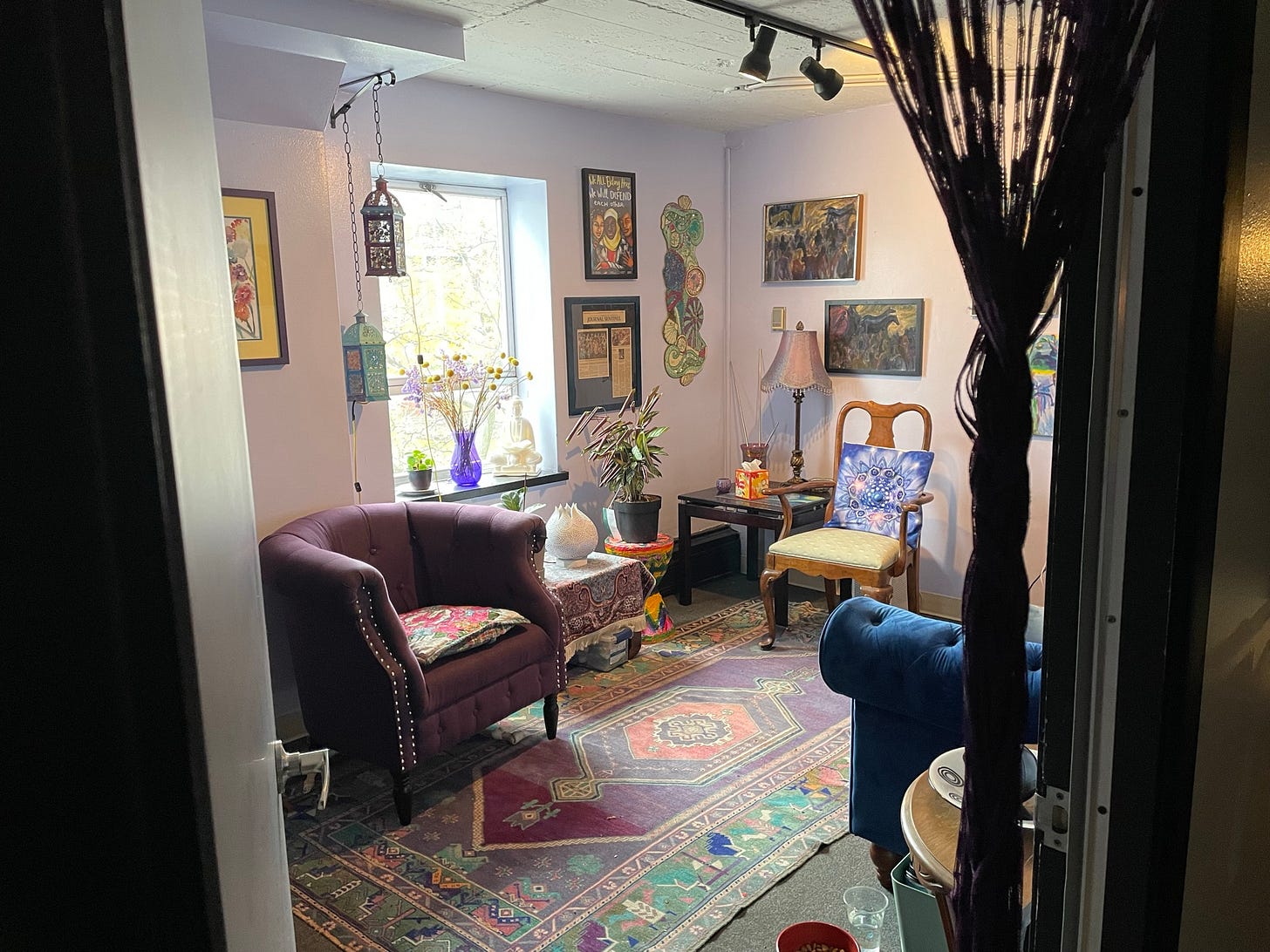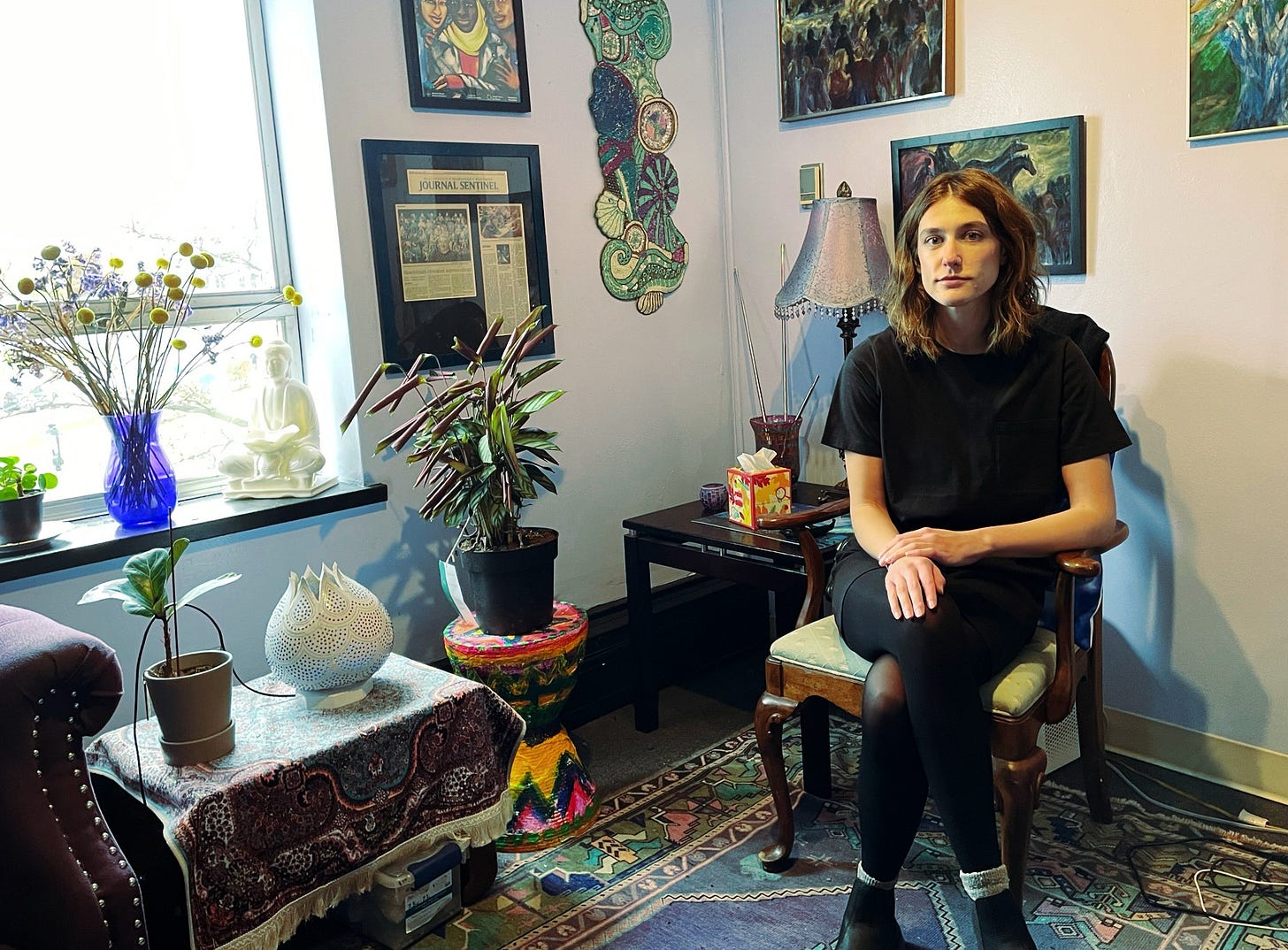Isabel Kent
Your Therapist’s Not Who You Think They Are
Who do you talk to when you talk to yourself? I mean the words you say internally, or quietly enough to hide under the sound of the shower or chopping vegetables. Maybe it’s a friend, a favorite author, or someone you once got into an argument with on the internet, who you keep returning to with the perfect comeback. I have dozens of these half-imaginary friends. Among the least embarrassing is Conan O’Brien, playfully asking me what new projects I’m working on. I tell him about the newsletter and my half-finished novel, maybe throw in something about how I’ve been thinking of getting into voice work. We always hit it off, being, in my imagination, men of similar ilk.
But most of them are people I’ve known personally, old therapists being a big one. It makes sense why. For myself and others who don’t practice a religion, or have a good relationship with their parents, a therapist is like a readymade elder. They don’t even have to be much older than us, just willing to be the bigger, smarter, kinder, more reliable person we’re looking for. But why? I mean why is it so easy to put our faith in these people who we know nothing about?
That’s what I was wondering when I got in touch with Isabel. She’s a therapist, but also a smart person who’s good at explaining things. So I thought she’d be the perfect one to ask. I’m still not exactly sure where things went off the rails. I guess, thinking it all over now, it was probably my fault.

I’ve actually known her for years, even if we never spoke much. We graduated MIAD together in 2012, and since then have followed each other’s trickle of social media posts. I supplied the cat pics, food pics, and yearly remonstrations against the Air and Water Show. Her feed was more impressive, shots of her sitting seiza in a black belt and gi, marching in protests, wielding a spear-like weapon, half-succeeding at looking wistful beside Lake Michigan. Aside from a BFA, she has a blackbelt in ninpo and Master’s in clinical social work. She’s been an AmeriCorps member and a child welfare case manager. For 14 months she was a Zen monk. Like a real one--robes, meditating, vows of silence, everything. But I’ll get to that.
Waiting for her outside Creative Counseling, I was mostly thinking of her old art. Specifically, a quiet paper mobile hung in a corner of the school exhibition space. I was in the same show, and made something equally characteristic of my early twenties, a 400-pound pine slab that I cut with a lumberjack saw and sold by the inch.
This is all I had to go off of, just getting acquainted with her. Coming off the elevator, she did seem like someone who would have made a paper mobile at some point in her life. Though I wouldn’t really describe her as a delicate person, considering all the martial arts training. Elegant isn’t quite right either, I thought, watching her flip through her ring of keys twice, jamming them into the lock one after another. She apologized each time they didn’t turn, in a slight Wisconsin accent that makes sorry sound especially sincere.
She’d been a therapist for years, but only started this new gig a week or two before. Maybe it’s silly to expect a blackbelt-monk-therapist to have an easier time with locks than the rest of us, but I don’t know. Admittedly, I felt a little awkward standing there, and not in the usual way. Maybe this was where things started to go south.
I didn’t have time to wonder, because before long she’d shown me in and taken her spot at the upholstered chair in the corner. She settled there, and in the span of two seconds, seemed pretty much exactly like a therapist. You know the look--straight but not rigid, attentive but not scrutinizing, open and accommodating, but also contained. With hands folded and legs crossed, her face was almost as tranquil as the porcelain Buddha four feet to her right.
And so we talked. I asked all my questions and, for a second, it was exhilarating. Here I was, finally satisfying my curiosity, getting inside the head of a therapist. Maybe you imagine, like I did, her side-stepping, redirecting, or flat-out refusing to answer, solemnly citing Confidentiality, and giving me a stern look. But, not really, actually. She was honest and forthright. Maybe a little shy, but only because she wasn’t used to having the spotlight turned on her.
I felt like I’d won a carnival game by sheer dumb luck. Just waltzed up, chucked a dart into a cup or something, and was handed an enormous pink giraffe. Then the whole long walk through the parking lot, wondering if I’d have enough room for it in the back seat, and what piece of furniture I’d have to sell to properly display it.
How are you liking my metaphor-work, by the way? Sometimes I feel like I get a little carried away. I had like three paragraphs on the giraffe before I realized none of that ever actually happened. Anyway, to be crystal clear, my disappointment was not Isabel’s fault. She’s not a pink giraffe. She’s an interesting person who’s a lot of fun to talk to. It’s just that her posture and facial expression at that moment happened to remind me of someone I care a lot about. And when she didn’t match up to my memory of that person, some wires got crossed.
Has this ever happened to you? You’re talking to someone at work or school, maybe someone serving you coffee or changing your engine oil, and from nowhere comes this feeling, way out of proportion to the person, but also weirdly attached to them. Maybe it feels like curiosity, or distrust, or affection, or fear. But ultimately, you end up discovering that the feeling, whatever it is, has more to do with you than it does with them. Can I suggest, without coming off as too presumptuous, that it’s happening to you all the time, whether or not you’re aware of it.

In Isabel’s industry, it’s called transference, the mechanism by which we shift our leftover feelings for parents, friends, lovers, or really, anyone, onto another person. It’s the reason why people who grew up in a loving, supportive home, tend to find love and support from others. It’s why people with cruel, narcissistic, or controlling parents often don’t. But transference plays a role in all of our relationships. It’s the reason behind the disproportionate feelings we sometimes have for strangers, and why therapists often feel like such special people to us.
Actually, it’s what makes therapy work in the first place. A therapist is a person with specialized knowledge and training that allows them to temporarily empty themselves of opinions, biases, and to some extent, feelings, to make room for whatever the client wants to put there. In therapy, transference isn’t a problem to overcome. It’s the point of being there.
Outside of therapy though, transference comes with a heavy cost. If you’ve ever been heartbroken over a person who doesn’t know your name, or are regularly butting heads with your whatever-in-law, you know what I mean. It doesn’t matter if you’re casting the other person as a hero or villain. The role you’re projecting stands in the way of the person themselves, so you never get a chance to know them.
In the case of this article, the cost has been passed on to you, the consumer. Because here you are, almost at the end, still not having learned much about Isabel.
The good news is that with enough talking, empathy eventually wins out. I think that’s why I like talking to people so much. After about an hour, I ran out of questions, and our conversation had a chance to wander. She talked and I listened, and soon she seemed less like my old therapists and more like--someone new.
If this sounds like the beginning of a story rather than the end of one, there’s a good reason for that. Because what Isabel and I ended up talking about wasn’t her work as a therapist. It had more to do with the fourteen months she spent at a Zen monastery in the Santa Lucia Mountains. How she’d set aside friends, family, career, electricity, disposable cups, and most forms of self-expression, in exchange for some robes and an unheated shack. How, after six months, all she wanted was to get out. And what happened when she couldn’t.
I’ll tell you about it soon.
And I do mean soon! I know I’ve been a little stingy with you all this past month. If it wasn’t obvious, this was a tough one for me. I ended up editing about 20 pages of writing down to what you see above. The next one won’t be so long in coming.





I thoroughly enjoyed this article Brad, thank you. (And now off to see my therapist on Zoom in 2 hours!) PS, have you watched Couples Therapy on Showtime? It’s so interesting to see inside a therapists office like that. I loved your diagram, Isabel’s history with art & travel, and I look forward to the next installment.